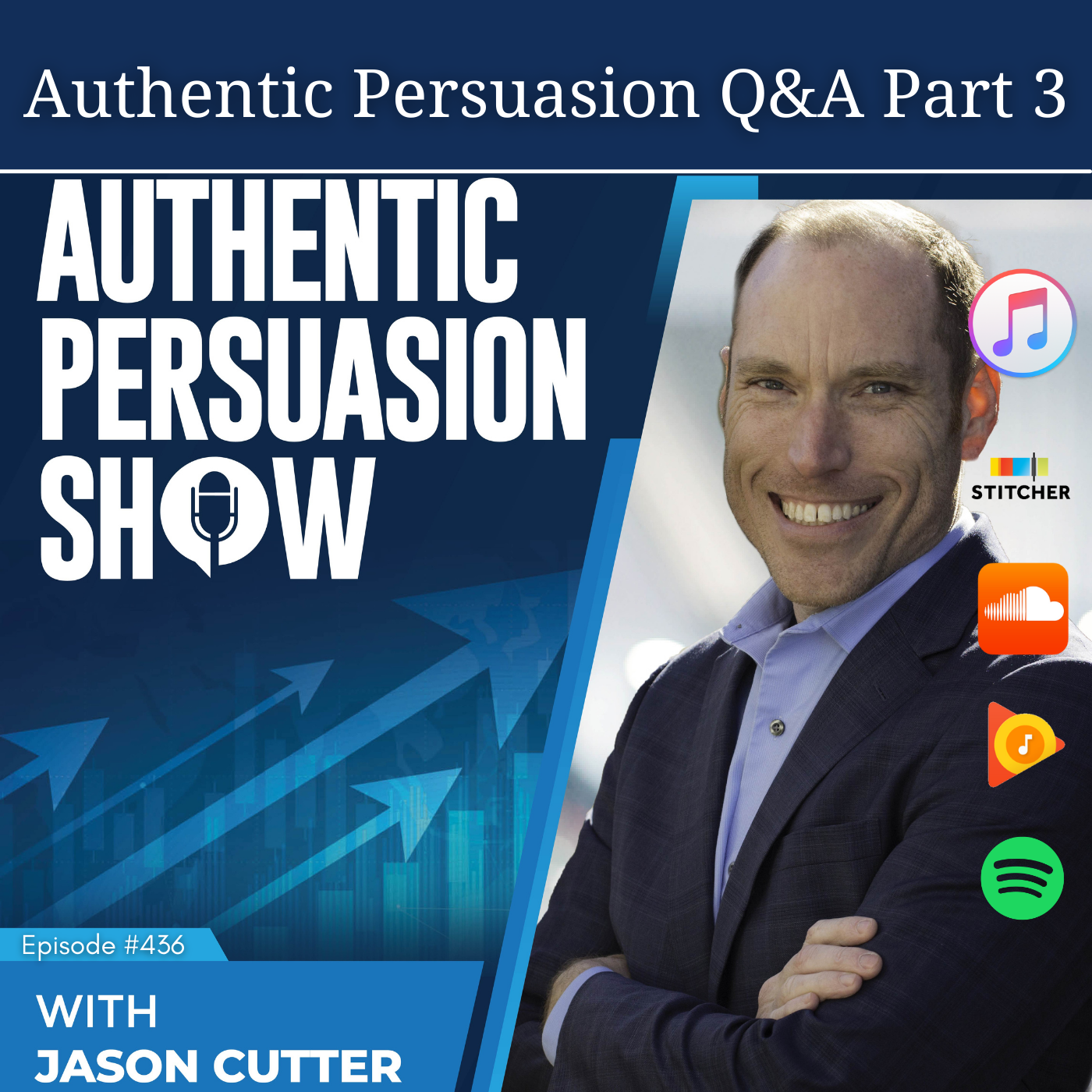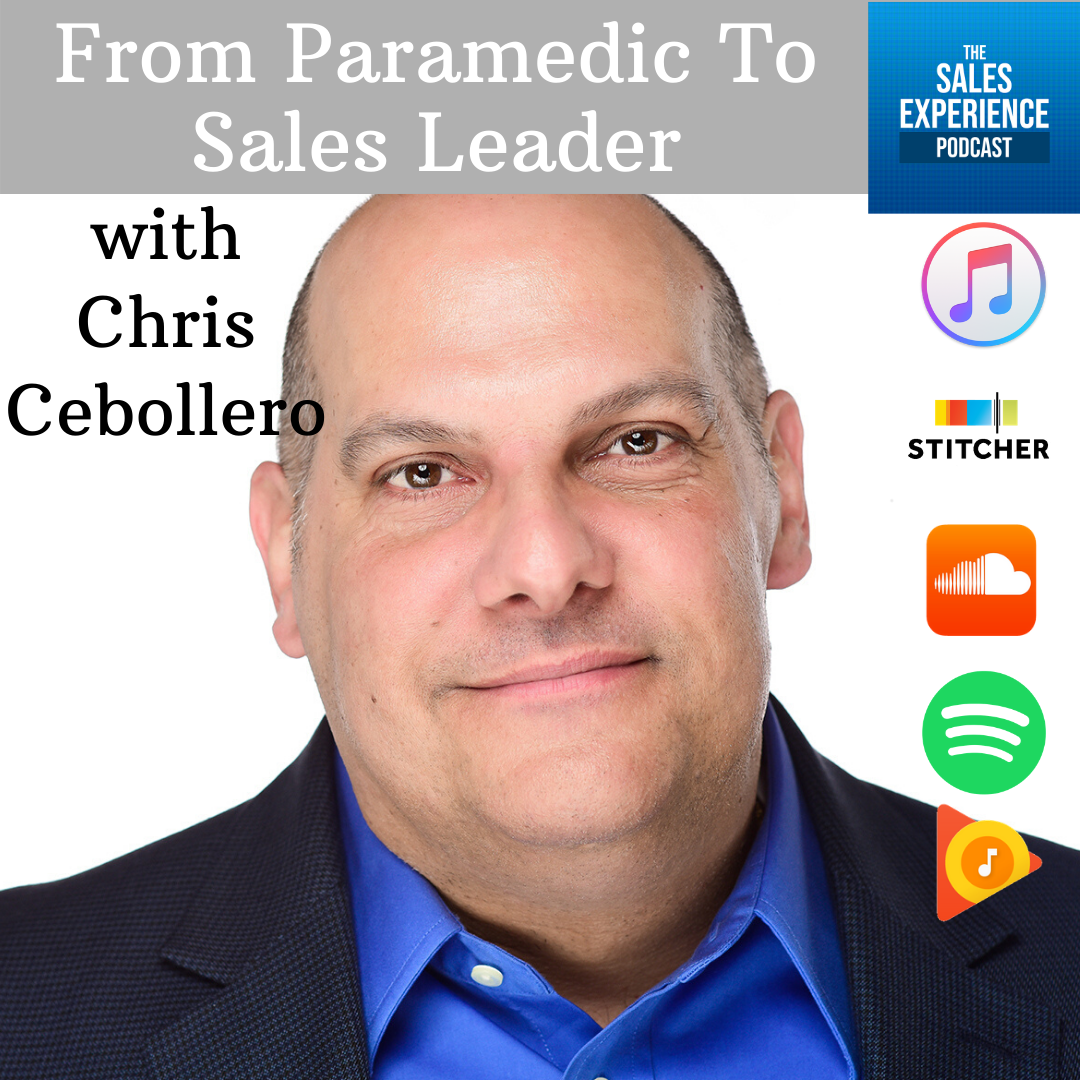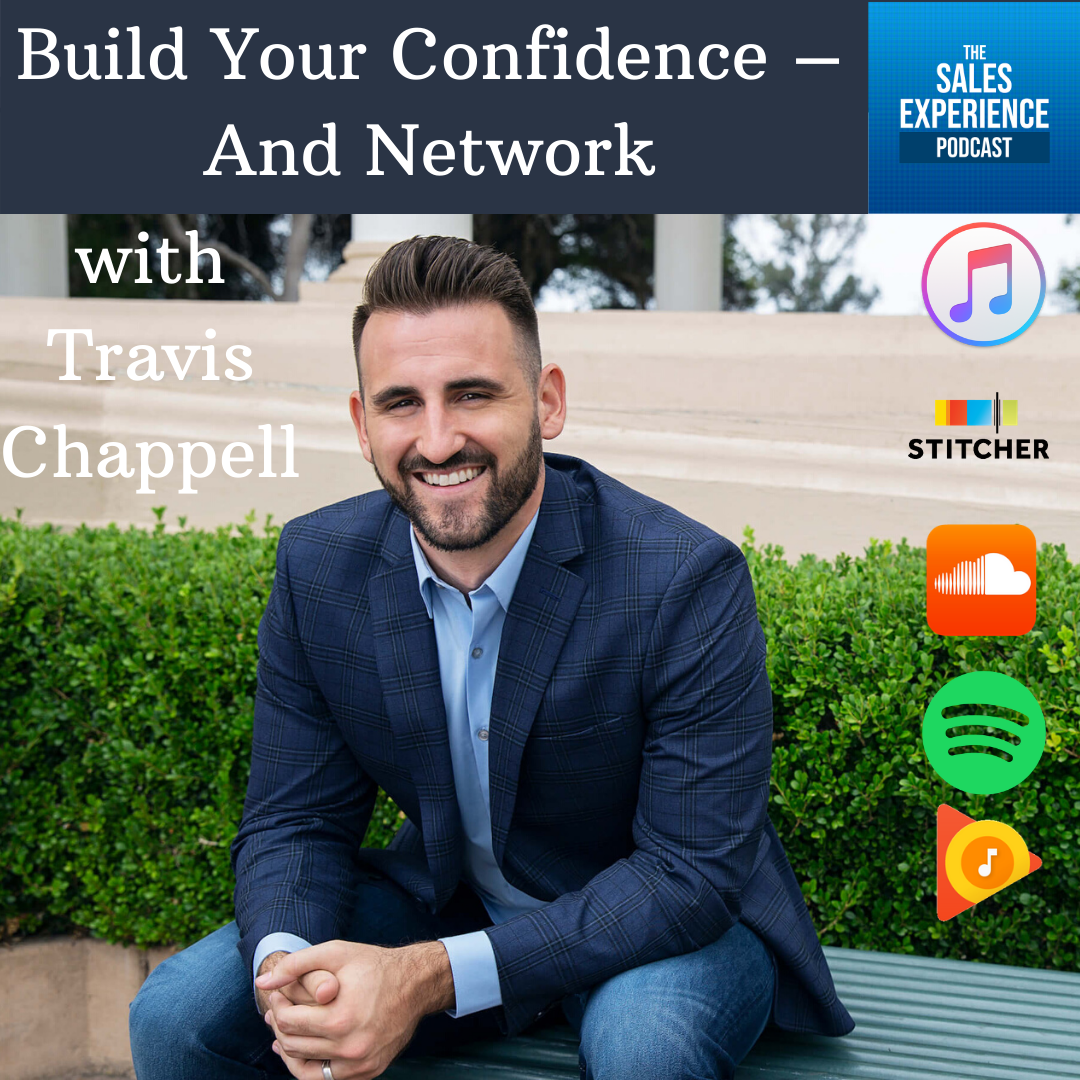Episode Transcript
Jason: Welcome to another amazing episode of the sales experience podcast. This is the final part three of my conversation with the fantastic, powerful Dr. Wayne Baker. He is such a great person to talk to. I had so much fun chatting with him and getting connected with him. At the end, he's going to share his links, best resources, best way to get in touch with him, his material, and hopefully move forward in your process of asking for what you want, which is so valuable in life and in sales and everything that you do.
Here you go. Part three, enjoy.
Three or five years down the road, what does success look like for you? And actually write it out as a narrative, vivid details. As if we went forward in a time machine and you were showing everyone of all these great things that had happened, if you've got that in mind, then you can start backing up from there and say what do I need?
What do we need to ask for?
Dr. Wayne: And that is great because one of the things that I focus on, even before I get into sales strategies or processes with teams is the why, like, why are they there? What would they put on their vision board? Have them actually make a vision board so that they can have that reminder.
Because I think what you said is correct. For most people, it's that fear of rejections, the fear of failure, fear of looking bad. This crazy primal lizard part of our brain that still thinks it's in survival mode. And it's afraid of being kicked out of the tribe of humans by some kind of rejection.
Because if you got kicked out and left behind as the tribe moves on. You're toast like that's it and so our brain still thinks that and it's afraid and what I focus on which I think is great. I think your exercise is brilliant. The other one that you hear a lot is write your eulogy of Looking at it and for sometimes that's way too far in the future and that's too big So I like your idea of three to five years.
What is that? Vision of success, but understand why you're doing what you're doing. What's important to you really? Why you get out of bed. I think a lot of people just float through life and they go through the motions and they're not clear on why they want to do it. They're just checking boxes as they move along.
And if you want to be successful, especially in sales, and you want to get past rejection, short term long term, you've got to understand why, and then you've got to make sure that why is much bigger. Then those fears or those concerns,
Jason: You mentioned rejection or a no, you have to train yourself to look at that as information, right?
And a no information. Yeah. Could you say, sometimes say, okay, that's fine. But could you tell me a little bit more about why you said no? You might learn that they said no, for some reason that you never even thought of.
Dr. Wayne: Yeah, you just assumed. Yeah, you just assumed, right?
Jason: That you knew why they were saying no.
And it could just be that the timing was bad or it was the wrong time in the budget cycle, but come back a month later and they'll say yes, right? So sometimes following up with another request, another ask, which is a polite why to the no that they received. And to think of every no as a lesson with information that you can use to make a better request the next time.
Dr. Wayne: And that goes back to what we talked about earlier on, which is that open, curious mindset of success, where you want to know more, you want to grow, you want to learn and understand because all of it is just bits of information to help you change or grow or become more of who you are and improve. Again, going back to that game footage analogy, it's that same thing, right?
Asking that person who just told you no. Like why in a nice, empathetic, caring way, not in a defensive, like argumentative way, which doesn't work that people do, but it doesn't work. Asking them with the right intention and then getting that feedback. If you're doing that and you want to know it so that you can just improve, either you want to improve that relationship or you want to improve yourself.
Maybe there was something you missed in that conversation that next time you could do better. That's really the people who win. More in those interactions.
Jason: Yeah, absolutely. But I think that's part of the mindset and with these kinds of tips and practices that we've been talking about. I encourage people to have a list of these and try some experiments.
Try some things out. The next time you get a no, pause, take a deep breath and say, okay, politely, could we talk about why? So that I can learn from that. And most people don't like saying no and will be happy to say yes to the next request, right? Which is, help me learn, help me understand, right? So that should be an experiment that everyone should try.
Dr. Wayne: Yep. And One of the things I used to do and I train reps on is when somebody says no, if they're a perfectly qualified prospect, that should be a customer on paper, it's a perfect fit. They have problem X. You have solution X. It's a perfect marriage. They said no. Those are the ones where you want to ask.
And I do it from that empathetic place. Like we've been talking about, which is, Hey, Bob I understand that you said, no, I'd love to find out more because it seems like this would be a perfect fit for you. And it seems like we both agreed. And I just really want to know, because if it's something that I could do better next time, I want to make sure the next person I can help.
I'm successful in helping, right? Even if this is a hard no and Bob's never going to talk to me again, I also want to know because I don't want to miss a chance like that if it's something I could do. Yeah, absolutely.
Jason: And do it in a way that you're not trying to manipulate them into saying yes now, right?
It's the hidden objection that they didn't say the first time, but it's true and it's done in a true and authentic way that you really do want to learn. So that next time with some other person, you could be a little bit better.
Dr. Wayne: And you also have to watch out because I mentioned this too, is it's the tone, the attitude and the intention, which is why I brought that up earlier too, is what sometimes what happens is what do you mean though?
Do you not want to save money, Bob? What is it about this that you don't like that's just going to cause somebody to dig their heels in more and make it worse. So it's really that whole reason why the, your M right, the meaning.
Jason: Or you say you can't say no because if I close this sale, I'm going to top the leaderboard.
Yes, because then it's all about me, the salesperson and not about the other person.
Dr. Wayne: Yeah. You can't say, no, we got to figure out a way to do this. It's the end of the quarter and I've got to make my numbers. So tell me what it's going to take to get this deal done. That's a terrible start to a relationship, even if they say yes, because now they own you.
And you're in trouble.
Jason: Not only that, but they'll never fully trust you again either.
Dr. Wayne: And I see that again, obviously this is a podcast for people in sales and sales leadership, but that in all walks of life, in relationships, personal and business, people trying to get a job, people interviewing and they're desperate for a job.
And they make those kinds of statements or concessions. And then they start off that relationship poorly as well. Hey, it's Jason here. We'll be right back to the podcast. But first, are you ready to change the way you view your selling role and become a sales professional? Do you have a team that is hungry for new ways to improve and grow?
If so, I have various coaching and consulting programs available that might be great tools to help you achieve your goals. To learn more about the ways we can work together and to book your free sales power call, go to jasoncutter. com. Now let's get back to the episode.
Jason: I'm a professor and I teach people in business school, mostly MBAs.
Teaching is an act of persuasion. It is. I'm trying to get them to think differently about something that they do and to experiment and to try some things out. And as you said, everything sales, I say that, I'm trying to sell them on an idea that will be helpful for them. I have to put myself in their shoes is what their age is, where they're working, what their family constraints are, et cetera, et cetera.
And think about, okay, from their point of view, what would be useful? What needs do they have? And then I could tailor what I'm saying, my lecture, or you could call it my pitch, right? I could tailor it. So that they see how it will work and that would benefit from it rather than saying here's a lecture about all these things that you take from it.
I see my job is to make it easy for them to benefit from things that I've learned.
Dr. Wayne: And two things that are awesome with that is before we hit record when we were talking about it. You said, Hey, I'm not in sales and I've not been a sales person. So I'm not sure where we want to go with the conversation.
And I said, this will be great anyway. And obviously just like everybody, I think, and you probably agree, you are in sales more than you think. You just don't have title of sales and you're not trying to get credit cards or payment information at the end of the conversation, but you're selling something like you said.
So I think that's awesome. And I think you are in sales. And obviously if you do what you do at the level. that you're at, you're successful in selling, persuading and getting people to make that change. And it's fascinating to think of that role in school, which I've never thought of from a professor's side as a complete sidebar here.
Yes, you have warm leads. So you have some people who have come to your class and they're paying for it and they're showing up by choice, right? Like you didn't call them and twist their arm to come have a seat in your class. Like they made this choice and then you now have to take it from there. So it's definitely a warm lead versus a cold lead.
But to be the most effective professor and get the ideas across, you have to do it in still that, in that smart framework that you're talking about with your ideas all the time. So I think that's amazing. I think that's so cool.
Jason: And I do have cold leads as well. You do? Yeah, because a number of the courses that I teach are required courses.
So they don't have a choice. So they're conscripts. They're in the program. They have to take my course like it or not. And so I always say I have a bell curve. I've got, at one end, people who are very enthusiastic about the topic. At the other end, people who are really cynical and unenthusiastic and really don't want to be there.
And everyone else is in the middle. Most people in the middle sort of saying I'll wait and see. And my job is to shift people up towards the other side.
Dr. Wayne: And in sales, in my perspective is that's the same thing with prospects is that prospects are all in that bell curve. People are people no matter what.
And so most sales reps have a pipeline that looks that same or leads that look that same. There's the easy. Mostly referred to as a lay down. There's that person who knows what they want. It's clear they want it. Money's in hand. Transaction simple. There's the absolute no at the other end, which is no matter what you do, you're probably not going to get them to go.
Then there's everyone in the middle. Your goal is to move them forward if it's a good fit. The challenge is I see a lot of order takers where they're presenting information, they're not persuading, and they're not getting anybody but the easy ones at the high end of the bell curve, and they're not successful.
Successful. Salespeople using things like persuasion and being authentic. They're moving that group forward at a rate that others aren't. And then that's where the success is. Just like you're talking about with your students.
Jason: Yeah. Jason, our conversation made me think of another way in which my job as a professor is a job in sales, which is we teach, but we also are required to do research and to publish it like my new book, right?
You've got to, you have to convince a publisher. Or if you're writing an academic article, the way that it works, a scholarly article, it gets sent to anonymous reviewers in a double blind process where they don't know who you are, so there's no reputation effect, and you don't know who your reviewers are.
but there are three people are going to independently make a judgment on the quality of what you submitted and make their recommendations to the editor about whether it should be published or not. And in this business, it's the publisher parish, so you've got to do well teaching, but you've got to publish as well.
And that's a form of persuasion. And I guess it's a form of sales as well.
Dr. Wayne: It is. Everything is. I love it. I think this is great. And obviously I would love people to check out your book. And I'll put the show notes for everybody who's listening. It'll be on the website. Again, the title of the book is all you have to do is ask because I think that's so important.
Just everything in life. I've heard you speak a couple of times about this. And yeah, I think it's a valuable tool for everybody. Where else could people go to find your materials? Find information about you, the projects you're working on, the way that you help companies or individuals.
Jason: You can go to the website for the book where there's a lot of information about the book, but free resources as well.
So I developed an assessment that's in the book, but there's a free version of it available on the website. And if you take it on the website, the benefit not only is it free, but. You get a comparison to our population of assessment takers. Cool. I have a learning map. Our podcast will be up there after it's published and others as well.
It's the title of the book. com so all you have to do is ask. com and my contact information there as well. I love it when people connect with me on LinkedIn. When they tell me their story and I hear about, especially if something that I wrote or said on our podcast was helpful to someone, that kind of feedback is very gratifying.
And also if somebody tried something and it didn't work, I'd like to hear about that as well because that's how I learned.
Dr. Wayne: That's awesome. Dr. Wayne, thank you for being here and for helping people ask for what they want and achieve more in their life. I appreciate you and your time here and sharing what you're doing with my sales audience.
Jason: Thank you, Jason. I appreciate the opportunity.
Dr. Wayne: Yeah, and for everyone listening, like I said, the show notes, all of Dr. Wayne's links will be on the website Cutter Consulting Group dot com slash podcast. You can go there, find everything, including the transcript and make sure to subscribe and like the show.
Share this with everybody you know. This is a great episode, especially for anyone not in sales because it's all about asking and getting what you want. And as always, keep in mind that everything in life is sales and people remember the experience you gave them.
![[E229] All You Have To Do Is Ask, with Dr. Wayne Baker (Part 3)](https://episodes.castos.com/salesexperiencepodcast/images/TSEP-Dr-Wayne-Baker-Cover-Image.png)


